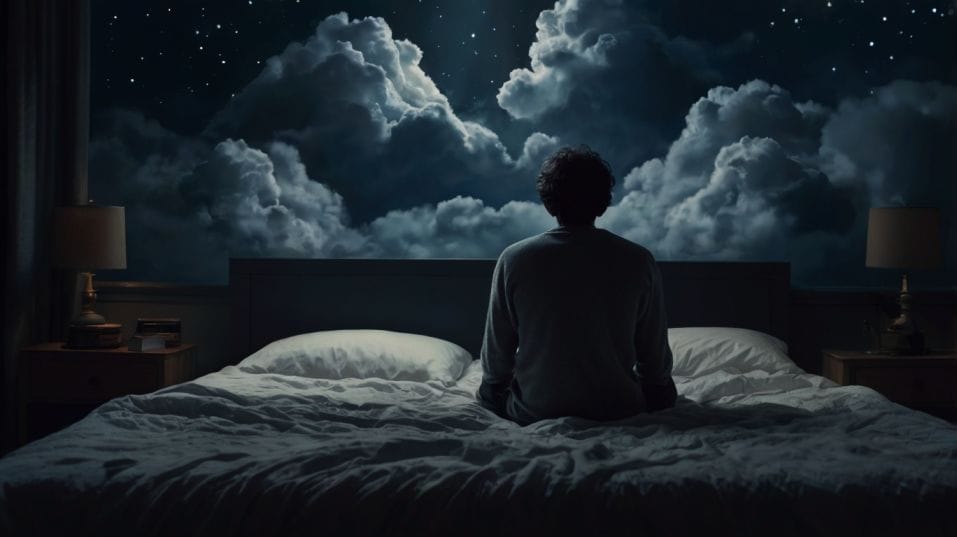The Connection Between Depression and Insomnia
Struggling with sleep and low mood? Learn how small, science-backed changes can break the depression-insomnia cycle and lift your energy fast.

What if fixing your sleep could ease your depression—without needing to overhaul your entire life? Poor sleep and low mood don’t just coexist, they fuel each other in a vicious loop.
But here’s the good news: even small shifts in your sleep habits can unlock real improvements in energy, mental clarity, and emotional stability.
If you're feeling stuck, understanding the science behind this link is your first step toward breaking the cycle.
Depression and Sleep: A Two-Way Street That Loops You In
Depression doesn’t just make you sad or tired. It rewires how your body handles stress, regulates hormones, and processes sleep.
And sleep, in turn, plays a huge role in how emotionally resilient you feel each day. Miss enough of it, and your brain chemistry tilts toward anxiety, irritability, and hopelessness—fast.
Here’s what’s happening under the hood:
- Neurotransmitters like serotonin and dopamine—which help regulate both mood and sleep—get disrupted. That’s why people with depression often can’t fall asleep, can’t stay asleep, or wake up way too early.
- The HPA axis (your brain’s stress response system) gets stuck in overdrive. That raises nighttime cortisol, keeps your heart rate elevated, and blocks deep, restorative sleep.
- Depression also disrupts REM sleep, the phase where your brain processes emotions and resets your nervous system. Without enough REM, emotional regulation takes a hit, and you wake up feeling flat, anxious, or on edge.

At the same time, poor sleep feeds right back into this system. Think of it like a loop: depression disrupts sleep → poor sleep worsens mood → mood spirals further → sleep quality drops even more.
This is why it’s so hard to “push through” when you’re stuck in this cycle. But it’s also why improving sleep—even a little—can start shifting things in the right direction.
The Real-Life Impact of Better Sleep
Here’s what happens when your sleep starts working for you instead of against you:
- Your energy gets steadier throughout the day.
- Your ability to focus and handle stress improves noticeably.
- Mornings don’t feel like an uphill battle.
- Mood stabilizes—you don’t swing so hard between “fine” and “can’t cope.”
These are real benefits, backed by research. You don’t need to sleep perfectly or meditate on a mountaintop to get them.
You just need to take control of a few key factors in your daily routine—especially the ones that regulate your circadian rhythm and calm your nervous system.
What to Do When You Can’t Sleep and Feel Low
Let’s skip the gimmicks. You don’t need blackout curtains made of astronaut fabric or a $600 sleep tracker. You need consistency, light exposure, and a nervous system that knows when to shift out of “go mode.”
Here’s how to make that happen:
Wake Up at the Same Time—Every Day
This is the anchor point for your body’s internal clock.
Even if your sleep was trash the night before, getting up at a consistent time helps lock in your rhythm and reduce long-term insomnia. Think of it as setting your brain’s operating system to “stable.”
Bonus: consistent wake-ups also help regulate cortisol and melatonin, the two hormones that drive energy in the morning and sleepiness at night.
Get Outside Within an Hour of Waking
Natural light is your circadian reset button. Just 10–20 minutes of outdoor light exposure—especially in the morning—helps boost daytime serotonin and tells your brain, “It’s time to be awake now.”
That signal makes it easier to feel sleepy when night comes. If you work early or live in a low-light area, a 10,000 lux light therapy lamp can do the trick. But actual sunlight is best.
Wind Down with Purpose, Not Just Habit
Scrolling your phone under the covers doesn’t count as relaxing. Your brain needs a clear, low-stimulation signal that it’s time to shut down.
Try this instead:
- Dim your lights at least 60 minutes before bed.
- Switch to something analog: reading, journaling, music, stretching.
- Keep your routine repetitive. Over time, these cues become automatic triggers for sleep.
Rethink “Sleep Hygiene”—It’s Not Just Clean Sheets
Most sleep tips focus on the bedroom. That’s important, but not enough. What you do all day affects how you sleep at night.
A few powerful tweaks:
- Avoid caffeine after midday (it has a six-hour half-life).
- Eat your last full meal 2–3 hours before bed.
- Move your body—daily movement improves deep sleep, even if it’s just a walk.
And don’t over-correct. Going to bed too early, taking long naps, or obsessively tracking your sleep can backfire. Keep your approach consistent, not extreme.
Address the Root, Not Just the Symptom
If low mood and poor sleep are dragging you down, don’t treat one and ignore the other. Both need attention. Cognitive Behavioral Therapy for Insomnia (CBT-I) and therapy for depression often overlap—and that’s by design.
They help you break the loop from both directions: stabilizing your sleep while improving how you think, react, and feel.
If you’re not ready for therapy yet, start with behavioral changes. Sleep is often the most powerful lever to shift first.
Final Thoughts
Depression and insomnia feed off each other, but you’re not stuck.
Small, smart changes to your sleep habits can create a ripple effect—lifting your mood, boosting your energy, and helping you feel more in control. You don’t need to fix everything overnight. You just need to start.
Set your wake-up time. Get outside in the morning. Build a wind-down routine that actually works. These are low-effort habits with high-impact payoffs.
Start tonight. Commit to consistency. Your sleep is the signal that tomorrow gets to be better.




